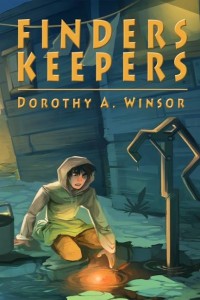“Why Read (And Write) Fantasy”
Not infrequently, I run into adults who are clearly skeptical about fantasy novels. Sometimes they even ask why I write fantasy rather than something “real.” These same adults roll their eyes when their kids read Rick Riordan or J. K. Rowling and say, “Well, at least they’re reading,” as if a fantasy novel is some sort of lesser book that might build a bridge to “real” reading.
In at least one way, I understand that skepticism because I’m an intensely practical person who’s uncomfortable with too much magic. At some point, I reach the end of my willing suspension of disbelief, and that point comes sooner for me that it does for many other people. As a matter of fact, I started reading fantasy only when my son was a young reader who was entranced by it.
I’ve come to see that fantasy is a good way for a middle-grade or tween reader to try out adult responsibilities and see kids take actions with real consequences.
Middle-grade and young adult fantasy allow a writer to put young characters in dangerous situations they wouldn’t face in Ames, Iowa, for instance. If the writer is clever enough, fantasy lets them take a dilemma a young reader might face in our world and show it acted out in a way our world doesn’t allow.
Readers can follow characters is stressful situations because in a quasi-medieval world, young characters aren’t stuck in school all day. Anyone who remembers high school or middle school knows that being locked up there can be pretty maddening. Adults boss you around and you have to do what they say no matter how unreasonable it is. And that doesn’t touch the jungle world of life among your fellow adolescents.
But in a traditional fantasy world, characters take on responsibilities that we reserve for adults. Most notably, they work, meaning they interact with adults and wider events. Their families often depend on the results of their labor to survive. They sometimes have to make decisions that affect another character’s survival or the way a war will turn out. In other words, in such a setting, a writer can up the stakes and strengthen tension.
For example, in Finders Keepers, Cade takes a delivery boy job partly to earn enough to eat and partly to search rich people’s houses for his missing mother. There’s no adult to check his less considered actions because he and his teenaged brother are on their own, a situation unlikely to occur in our world. That lack of guidance lets Cade get into situations that make for a much more entertaining story.
Urban fantasy achieves the same goal by throwing powerful supernatural creatures into our world, so the young character has to engage in a bigger than life struggle.
Given how crappy school can be, readers may be relieved to identify with someone not slumped in a desk. As a writer, I like being able to expose a character to danger and increase what’s at stake if the character screws up.
Additionally, both urban and traditional fantasy situations can be used as metaphors for normal life. For instance, when Cade learns he’s a Finder, he’s horrified because he’s been taught Finders are stone-mad and destructive. Through the story, he learns to accept what he is and be proud of it. Most readers aren’t going to learn they’re from a group their society imprisons, but they are going to find they’re nerds, or fat, or gay, or unacceptable in some other way, and maybe Cade’s situation will speak to them. So the fantasy genre gives me a way to treat a common young person’s need in a more intense, metaphorical way.
Not all genres speak to all readers, but for me, fantasy isn’t “unreal.” Rather it’s a way to get at reality in a more vivid and heartfelt way.
About the Author: Dorothy A. Winsor spent years as a technical communications professor, studying the writing of engineers, before discovering that writing YA and MG fantasy was much more fun. Finders Keepers is Winsor’s first novel, though if you look closely, you can probably find a literal million words of Winsor’s Tolkien fanfiction posted somewhere. Winsor lives in Iowa.
140-character story pitch: Boy senses presence of heart stones. Girl recruits him to steal some. World ends at New Year if they fail. Boy also rescues mother. Tricky.
Summary of Finders Keepers: The eight gods that govern the world are tricky and fickle, and even the most innocuous of their blessings comes with consequences. Those who find a blessing are cursed to dance on strings in exchange for good fortune. Which raises the question: is finding one good fortune at all?
Cade lives a simple life with his mother and brother, but when he finds a heart stone, he wonders if he can’t change that. Heart stones are said to bring luck to those who hold them, and Cade’s tiny family could surely do with good fortune.
But heart stones aren’t just tokens of good luck; simply tracking one down is a sign of a special gift. Cade is a Finder, just like his mother before him, but this gift is hardly what is seems; if the larger community finds out about this, Cade’s entire life will change.
And not for the better.
Now he lives outside the law, struggling to find a way to repair the disaster he brought home to him family, all while fending off a new hardship that he never anticipated: an overwhelming desire to have heart stones in his hands.
No matter the cost.
Thank you to Dorothy for her post!



